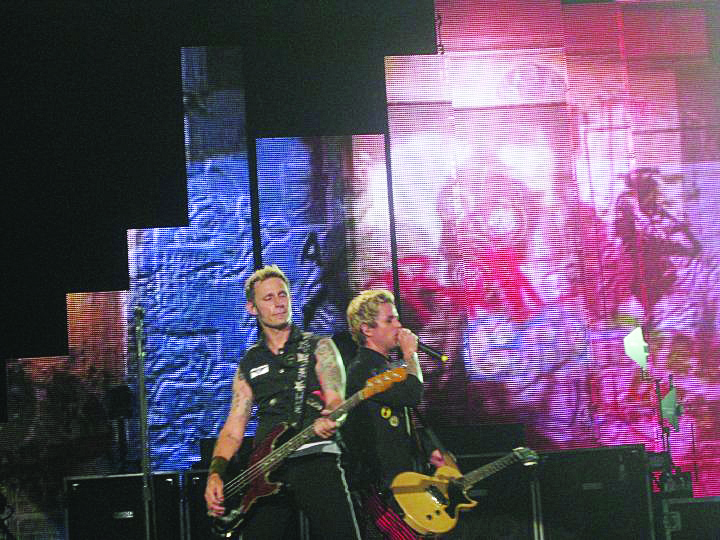Green Day releases first album of trilogy: ‘¡Uno!’

Frontman Billie Joe Armstrong and bassist Mike Dirnt performing August 31, 2010 in Alpharetta, GA
On Sept. 25, Green Day released the first album of their new trilogy, “¡Uno! ¡Dos! ¡Tré!.” Green Day’s prior two albums, “American Idiot” and “21st Century Breakdown,” contained somber subject matter involving war and politics, characters in songs with real life stories and sound meant specifically for stadium shows.
The album shows a movement away from Green Day’s previous styles into a fresher, pop-punk direction that serves as a throwback to their earlier roots inspired by Rancid and Operation Ivy. “American Idiot” and “21st Century Breakdown” were written as rock-operas.
In these albums, Green Day focused on worldly and societal issues. “¡Uno!,” on the other hand, covers multiple themes, namely pertaining to the story of the individual. However, there are still tracks that criticize society and the media, such as the opening title “Nuclear Family,” which ridicules life in the modern world.
“Carpe Diem” has a similar theme, commenting on how we’re “living a cliché” and asking “Aren’t we all too young to die?” In a later track, Green Day slams the media with “Kill the DJ,” pointing out media’s personal corruption clearly in the line: “We are the vultures/the dirtiest kind/the culture wars/in your heart and your mind.” Despite these songs, “¡Uno!” does not focus on these worldly, anti-establishment themes as much as the prior albums. Nevertheless, they do revisit their angry, antagonistic style of the 90s in “Let Yourself Go,” a song about not wanting to listen to someone’s complaints and lies.
The fast-paced style and explicit lyrics are reminiscent of past albums, such as “Nimrod” and “Insomniac.” “Loss of Control” has a similar style, and the lyrics also exhibit a personal grudge more commonly found in their earlier albums: “I’m gonna hide in the shadows ‘cause I really got nothing to say/We never had anything in common/and I never liked you anyway.”
Later in the album, “Rusty James” also recalls the band’s older style and reflects on Green Day’s grassroots at 924 Gilman Street, a punk club in the East Bay area of California. This club is where Green Day first became popular.
In “Rusty James,” the band remembers older punk groups that they grew up with. The song explains that these bands have fizzled out of today’s music world, and current pop-punk bands are, in their opinion, not nearly as good. However, the most prevalent themes in “¡Uno!” are love, lust and the confusion between the two.
“Stay the Night” is the first song with such a theme. It is an anti-love song about “hooking up” and not wanting the night to end: “I gotta know if you’re the one that got away/even though it was never meant to be/So say you’ll stay the night.” With an endearing, catchy tune, “Fell For You” is about sharing a kiss in a dream, then waking up to feeling in love. “Troublemaker” is a lustful song about a “jezebel/hot as hell/sunburnt in a pink bathing suit.”
“Angel Blue” is another anti-love song of frustration and unrequited love, and “Sweet 16” is a song where lead singer Billie Joe Armstrong reminisces of his romance with his wife, Adrienne. Finally, the album ends with “Oh Love.”
This radio single questions the difference between lust and love: “Far away, far away/waste away tonight/I’m wearing my heart on a noose.” Green Day will release the sequel albums “¡Dos!” in November and “¡Tré!” in January.
“¡Uno!” demonstrates that the 20- year-old band still identifies with its punk roots, while continuing to address mature subject matters within their song lyrics, a characteristic Green Day has become known for throughout their career.

